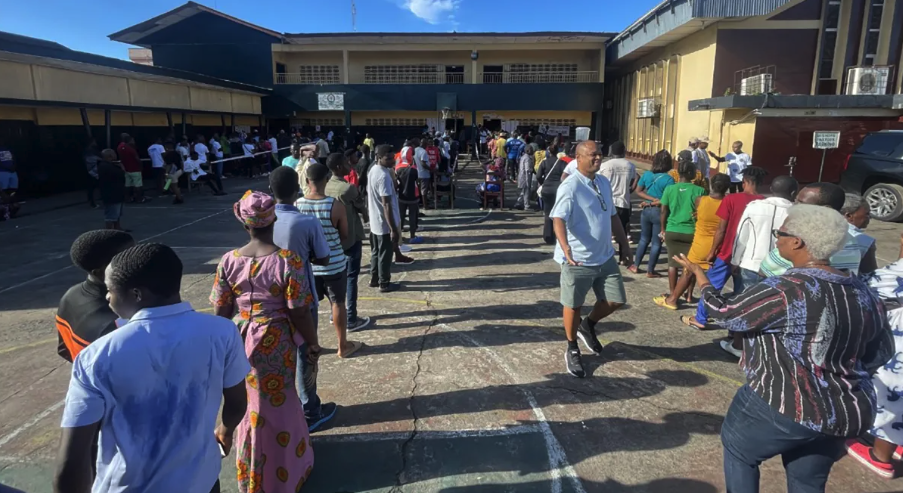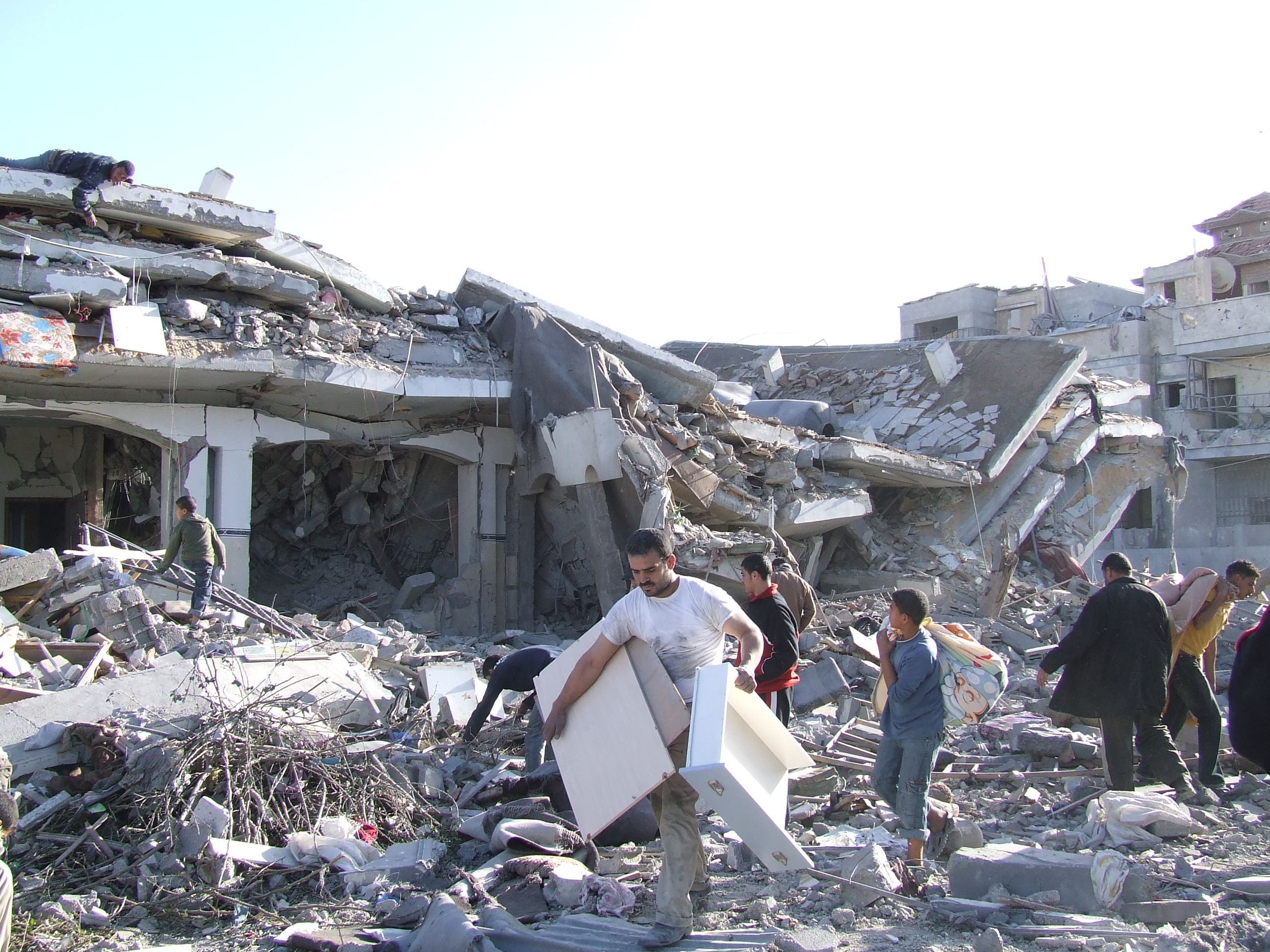News
Liberia Faces its Biggest Test as Election Rivals Head for a Run-Off
The danger of a raised political temperature and confrontation looms. For the sake of Liberians, let’s hope that the memory of the war is strong enough to hold the peace.

Research Director, The Brenthurst Foundation

Associate Researcher, The Brenthurst Foundation

It is two days before voting and Tubman Boulevard in Liberia’s capital, Monrovia, is heaving with traffic. Cars have driven to a halt, emitting clouds of noxious exhaust fumes. Between the cars, lines of motorcycles defy the laws of physics and wind their way through the logjam. Between the motorcycles, lines of people wearing blue T-shirts weave their way to the final election rally.
The air is thick with loud, thumping music; people are dancing, cheering, and screaming their support for the Liberian president, George Weah, whose Congress for Democratic Change (CDC) party is hosting the rally. As the rain comes down, politicians shout from the stage, their images repeated on giant screens as the crowd cheers.
The atmosphere is one of hyped-up exuberance as fanatical supporters demonstrate their loyalty. This is democracy at its most expressive.
But that same night, not far from the rally, it is reported that two Liberians have been killed, the latest of five to die during campaigning — depending on whom you believe. Although contained, the violence nonetheless raises the spectre of a return to conflict, alarming Liberians who are still digesting the country’s two civil wars in which hundreds of thousands perished.
In the first civil war, Charles Taylor led a nationwide rebellion against the government of Samuel Doe, who had taken power by coup. About 200,000 people died before peace was established after an intervention by the Economic Community of West African States (Ecowas) and the United Nations. Doe was brutally killed.
After two years of relative peace with Taylor winning an election, new rebel forces entered the country from the north and the south. As they gained ground and mounted a siege of the capital, Monrovia, Taylor fled to Nigeria. Some 50,000 lost their lives in this conflict.
Peace and democracy
The modern era of Liberian peace and democracy began with the signing of the Accra Comprehensive Peace Agreement. Ellen Johnson Sirleaf became the first elected female head of state in Africa in 2007, and under her firm but reconciliatory rule, the country entered an era of greater peace. Since then, elections have seen several changes of government, with Weah’s CDC winning the 2017 election — terms are six years long in Liberia.
St Peter’s Lutheran Church on Tubman Boulevard was the scene of one of the worst atrocities of the Liberian civil wars. More than 600 people were mowed down by 30 government soldiers loyal to Doe on the church grounds where they sought refuge.
On election day (10 October), the church, with its modest spire, hosted two polling places. As the voters patiently queued up in the heat — the temperature would rise to over 36 degrees — it is hard to believe that this was the site of such brutality.
In contrast with campaigning, voting is quiet and orderly, with young and mostly female Liberians wearing the blue bibs of the National Elections Commission (NEC) in firm control of proceedings. Party agents line one wall, taking notes, while the elderly and persons with disabilities are allowed in first.
This is the pattern across Liberia as our observation team, led by former SA president Kgalema Motlanthe, observes voting in five counties. There are voting stations where the queues are not well managed and tempers flare, but all eventually get to cast their ballots.
With the exception of areas where rain has made bridges impassable, causing voting to be delayed, Liberians turn out in large numbers.
Liberians were nervous because, for the first time since the restoration of democracy in 2007, the country was running the election on its own, without the help of the large United Nations Mission in Liberia (Unmil) contingent that had provided logistical and security assistance.
According to several sources, the Liberian National Police has an estimated 5,200 officers, while the NEC has 5,800 polling places. For a population of more than five million and 2.4 million registered voters, there was some cause for concern. The mobilisation of the Election Security Task Force, which included the Liberian Immigration Service, Liberia Drug Enforcement Agency and the Liberia National Fire Service, into a much larger combined security force was thus imperative.
On the day of voting, these doubts were dispelled as no incidents which could call voting into dispute occurred. Once the polls closed, the meticulous process of counting the votes commenced. It was a painstaking process of ensuring that all watching party agents signed off on all the steps and that all ballot papers were accounted for.
In the case of our mission, one team had to leave a polling station during counting after threatening behaviour by a crowd of agitators but returned later. In the early hours of the morning after voting, results were pasted up outside polling stations for the public to inspect.
The process of gathering the count in regional and then national tallying points began. As the count mounted, official results suggested that Weah and his arch-rival, the former vice-president Joseph Boakai, were running neck and neck, with neither likely to cross the 50% threshold, necessitating a second round of voting.

With just over 93% of the count completed on Tuesday, Weah had 43.65% of the vote, while Boakai had obtained 43.7%.
Both parties promised their supporters that they would win in the first round. At the final Weah rally, the most common utterance was the shouting of “Weah, one round!” while shaking a finger.
The NEC’s next test will be to manage the announcement of a run-off vote, should this occur, bringing down temperatures and preparing the logistics for another round of voting, probably towards the end of the year or early in 2024.
Campaigning is likely to be intense. Both parties employ what are described as “battle criers” who act as marshals at rallies, but also march about in public shows of force.
The danger of a raised political temperature and confrontation looms. The question is whether or not the NEC can take charge and run the show in such a heady atmosphere as its credentials are questioned by populists and the general population at large.
For the sake of Liberians, let’s hope that the memory of the war is strong enough to hold the peace.
This article originally appeared on the Daily Maverick
Photo: The Brenthurst Foundation

